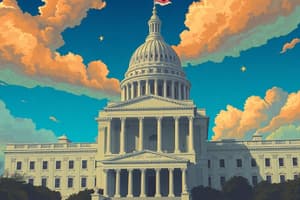Podcast
Questions and Answers
What is the function of the legislative branch?
What is the function of the legislative branch?
- Appointing Supreme Court justices and confirming treaties
- Passing bills and split into the Senate and House of Representatives (correct)
- Vetoing laws passed by Congress and serving as head of the military
- Establishing lower federal courts and settling disputes over constitutional laws
What is the role of the executive branch?
What is the role of the executive branch?
- Passing bills and split into the Senate and House of Representatives
- Appointing Supreme Court justices and establishing lower federal courts
- Serving as head of the military and confirming treaties
- Vetoing laws passed by Congress and making treaties with foreign countries (correct)
What is the responsibility of the judicial branch?
What is the responsibility of the judicial branch?
- Establishing lower federal courts and settling disputes over constitutional laws (correct)
- Vetoing laws passed by Congress and making treaties with foreign countries
- Writing and passing bills, and split into the Senate and House of Representatives
- Appointing Supreme Court justices and confirming treaties
How are Supreme Court justices appointed?
How are Supreme Court justices appointed?
What is the unique aspect of the legislative process mentioned in the text?
What is the unique aspect of the legislative process mentioned in the text?
What is the purpose of a system of checks and balances?
What is the purpose of a system of checks and balances?
What is the responsibility of the House of Representatives?
What is the responsibility of the House of Representatives?
Which branch is responsible for interpreting laws and ensuring they are constitutional?
Which branch is responsible for interpreting laws and ensuring they are constitutional?
Who has the power to veto Congressional laws and make treaties with foreign countries?
Who has the power to veto Congressional laws and make treaties with foreign countries?
What is the unique aspect of the Supreme Court's composition?
What is the unique aspect of the Supreme Court's composition?
Which branch can limit the power of the others, ensuring a balanced distribution of power?
Which branch can limit the power of the others, ensuring a balanced distribution of power?
Which ruling body is split into Senate and House of Representatives?
Which ruling body is split into Senate and House of Representatives?
Flashcards are hidden until you start studying
Study Notes
- The Constitution established three branches of government to prevent any one branch from having absolute power.
- Familiarize yourself with the legislative branch, which is responsible for writing and passing bills, and is split into the Senate and House of Representatives. Senators are elected from each state, while House members are based on state population.
- The executive branch consists of the President, Vice President, and Cabinet, and holds the power to veto laws passed by Congress, serve as head of the military, and make treaties with foreign countries, all of which require Congress' approval.
- The judicial branch, led by the Supreme Court, is responsible for establishing lower federal courts and settling disputes over constitutional laws. The Supreme Court is composed of nine justices who are appointed by the President and confirmed by Congress, serving for life unless they resign, retire, or are removed.
- The branches interact through a system of checks and balances, allowing each branch to limit the power of the others, ensuring a balanced distribution of power.
- The legislative branch has denied the President's request for war declaration only twice, in 1815 and 1999.
Studying That Suits You
Use AI to generate personalized quizzes and flashcards to suit your learning preferences.




